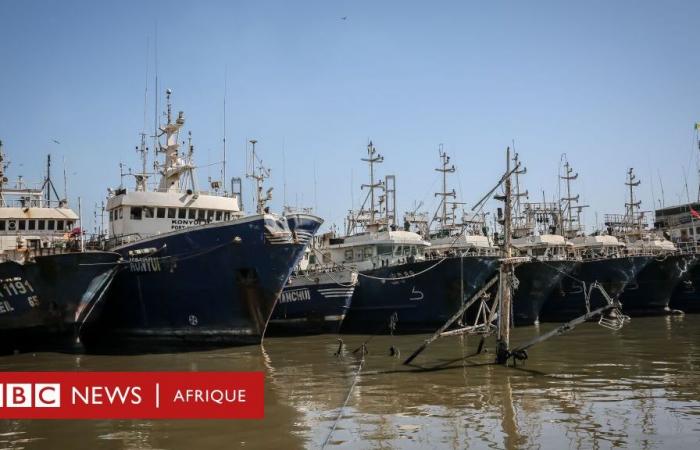Photo credit, Getty Images
In 2014, Senegal signed a partnership agreement for sustainable fishing with the European Union, in return for 1.7 million euros per year, allowing European vessels to fish in its territorial waters. Renewed in November 2019 for five years, the said agreement ends on Sunday November 17, 2024, at midnight, and will not be renewed this time.
The partnership agreement for sustainable fishing, which linked Senegal to the European Union, expires on Sunday, November 17 at midnight and will not be renewed.
Through its ambassador Jean-Marc Pisani during a press conference in Dakar on November 12, the EU criticizes Senegal for “failures observed in the fight against illegal, undeclared and unregulated (IUU) fishing” .
Eighteen Spanish and French ships are affected by this decision. These boats which fish for tropical tuna and hake do not represent real competition for Senegalese fishing, according to Jean-Marc Pisani.
The next day, on the occasion of a reception of donations for the victims of Kidira, the Senegalese Minister of Fisheries, Maritime and Port Infrastructure, Dr Fatou Diouf, questioned by the press on the issue, announced that “no vessel European Union will have the right to fish in our exclusive economic zone” after midnight on November 17.
Why will the agreement not be renewed?
Photo credit, Getty Images
“The protocol implementing the fisheries agreement between Senegal and the European Union (EU) expires on November 17, 2024, five years after the start of its application. Due to the failures observed in the fight against illegal, undeclared and unregulated (IUU) fishing, the EU cannot consider renewing the protocol until there is sufficient progress from Senegal in this area”, we can read in a press release published on its site by the communications service of the European delegation in Senegal.
“This decision is part of the EU’s zero tolerance policy towards IUU fishing and follows several years of discussion with the Senegalese authorities,” explains the press release.
“In the interests of political coherence, the European Commission has adopted the principle of suspending any renewal of a protocol implementing a fisheries partnership agreement with a coastal state until this decision is withdrawn” , he continues while recalling that “on May 27, 2024, the European Commission (had) pre-identified Senegal as a non-cooperating country in the fight against IUU fishing”.
“We can already say, and as we have already announced through the press, that the agreement expires on November 17 at midnight, that is to say the very day of the elections and that from midnight there will be no more fishing agreement”, underlined Dr Fatou Diouf, Minister of Fisheries, Maritime and Port Infrastructure.
Photo credit, Ministry of Fisheries, Maritime and Port Infrastructure of Senegal
She announced on the occasion the holding of a press conference or a press point which will take place shortly, therefore from November 20, after the elections.
“The country will be calmer and we will be able to really come in front of everyone to talk to you about these agreements, answer all your questions, and also talk to you about certain questions of interest for fishing,” promised Dr Fatou Diouf.
During the Pastef Coalition’s electoral rally in Guédiawaye on Tuesday, November 13, 2024, Dr. Abdourahmane Diouf, Senegalese Minister of Higher Education, wanted to provide an update.
“I would like to clarify because this week our friends in the European Union organized a press conference to tell the whole world that they have decided to no longer sign fishing agreements with the Senegalese government. This is an absolute untruth,” he said.
“It is the government of Senegal led by President Ousmane Sonko, led by President Diomaye Faye who gave the signal a long time ago to tell them that we cannot continue to sign fishing agreements with you which will impoverish fishermen Senegalese,” he explains.
What is IUU fishing?
Unreported and unregulated illegal fishing (IUU) or illegal fishing refers to any fishing activity carried out in violation of national or regional laws and regulations.
This includes fishing by vessels without authorization in maritime areas under the jurisdiction of a State, failure to comply with catch quotas, fishing in prohibited areas or with prohibited methods.
It is practiced mainly on the high seas and in the coastal areas of countries where regulations and controls are weaker.
What does Senegal gain or lose with this decision?
Photo credit, Getty Images
Senegal benefits from great biological diversity in maritime resources. There has been a partnership between Senegal and the EU in the field of fishing since the early 1980s. Which has always been beneficial to both parties.
“Over the last five-year period (2019-2024), he made a contribution of 8.5 million euros to the Senegalese state budget, or more than 5.5 billion CFA francs, which is add the royalties paid by shipowners”, revealed the communications service of the European Union delegation in Senegal.
“An envelope of 900,000 euros per year (590 million CFA francs) was intended for the implementation of projects chosen by the Senegalese administration to support the development of the fishing sector and its governance, including monitoring and research. necessary for the preservation of fish stocks”, adds the press release.
According to the EU, “over this five-year period, the catches of the European fleet in Senegalese waters represent less than 1% of the total catches declared and made by all fleets in Senegalese waters, i.e. nearly 10,000 tons of fish.
“These catches, targeting only tuna and black hake, were made in Senegalese waters beyond 12 nautical miles from the coast, thus avoiding interference with Senegalese artisanal fishing activities,” the text continues.
Apart from Senegal, the European Union had also signed fishing partnership agreements with Cape Verde, Guinea-Bissau, Mauritania, Gabon and São Tomé.
However, fisherman Amsatou Ndiaye from Kayar says the complete opposite of what the EU press release says. According to him, European Union boats have not respected the terms of the agreement, because instead of operating on the high seas to fish for tuna and black hake, they come to the coast (on the continental shelf ) destroy the habitats of fish in transit.
“Industrial fishing is supported by a national fleet of 118 vessels and a foreign fleet of 19 vessels in 2019 compared to 122 national vessels and 19 foreign vessels in 2018, a reduction of 4 national vessels,” informs the National Statistics Agency. and demography in its Economic and social situation of Senegal as of 2019.
“Industrial fishing is made up of the segments of trawler fishing, tuna fishing and sardine fishing. This fishery represents 19.0% of maritime fishing landings. Its production amounts to 106,118 tonnes in 2019 against 118,561 tonnes in 2018, a drop of 10.5%”, underlines the ANSD.
“Compared to 2018, the commercial value also contracted by 15.6% in 2019 to stand at 74.5 billion FCFA. Industrial fishing supplies processing factories and constitutes a significant part of product exports. fisheries”, reveals the ANSD.
Consequently, this strong pressure on fishery resources exerted by more than a hundred boats flying foreign flags leads to a scarcity which affects several hundred players in the artisanal fishing sector, including fishermen, processors and fishmongers.
More than 10,000 active canoes operating in artisanal fishing were ultimately suspended.
What does this mean for Senegalese fishermen?
Photo credit, Getty Images
Senegalese fishermen appreciated the news. Most of them believe that it is a godsend since the scarcity of resources resulting from fishing agreements has led them to migrate to Spain by canoe.
“If we learn that the fishing agreement will not be renewed, we can only rejoice,” reacts Amsatou Ndiaye, a young fisherman from Kayar.
“We only have the sea to feed our families. We were born and raised in this environment. It is our livelihood. Fishing is an important economic sector. As proof, at the end of the harvest each year, the Cayor farmers always come to join us in the coastal towns to find what they are looking for,” he explains.
“This is good news for us, because fish move in all seasons through migratory flows and boats, which know their passage areas, take up residence there to intercept them. This is what has led to the scarcity of resources This is why we cannot enjoy the sea,” continues Amsatou Ndiaye.
Better, continues Amsatou Ndiaye, “this is the reason why fishermen migrate to Spain; those who can leave go there and those who cannot send their children.”
Photo credit, Getty Images
Photo credit, Getty Images






